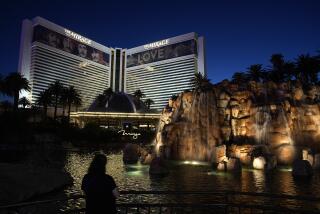Losing the Old Las Vegas Is a Bad Deal for Everyone
- Share via
It was only a matter of time before Las Vegas went through the same cycle of accelerated corporate concentration and conglomerization that has reshaped the rest of America’s economy. And now it has happened.
Last month, Los Angeles billionaire Kirk Kerkorian’s behemoth MGM Mirage gambling corporation announced that it was gobbling up rival Mandalay Resort Group, giving one corporation control of almost 50% of the business on the Las Vegas Strip. MGM Mirage will own more than 36,000 rooms, 22,000 slot machines and 1,000 gaming tables. Now comes word of another gambling mega-merger: Harrah’s Entertainment has declared its intention to purchase Caesars Entertainment. If that deal goes through as expected, Harrah’s and MGM Mirage will control about 70% of the Las Vegas Strip properties.
What difference does it make if Wall Street corporations monopolize Sin City? Who cares if two corporate giants corner the market on green felts and one-arm bandits?
Well, for one, I do! This is terrible news for anyone who even occasionally gambles. And if you think our fate doesn’t matter, you’re wrong. What the corporations make happen in Vegas hardly stays in Vegas. It’s just one piece of a national pattern.
There’s no need to guess what an expansion of corporate ownership will mean in Vegas. I saw it firsthand a few weeks ago at the once-venerable Binion’s Horseshoe casino in Las Vegas’ frayed downtown -- a casino I favored for years for its warmth, folksiness and no-nonsense attitude.
Opened half a century ago by the legendary gunslinging, Texas-born horse-rustler Benny Binion, the casino -- with its low ceiling and Louisiana bordello decor -- attracted hard-core gamblers more interested in the flop of the cards than the cleavage of cocktail waitresses. Benny ran the hottest, most-player-friendly games in town and was known to take any bet put on the table, no matter its size. He also as much as invented the Vegas “comp” system, generously kicking back free drinks, food and rooms to customers kind enough to gamble away their bankrolls. “Treat ‘em all like millionaires” was Benny’s motto.
Last year, his heirs ran into financial trouble and were forced to sell the family business to the corporate bean counters at Harrah’s. Old-timers were holding their breath, worried that the new owners would despoil this Fenway Park of a casino. Those fears turned out to be well founded.
In a complicated deal, Harrah’s immediately resold the Horseshoe casino to MTR Corp., which then rehired Harrah’s to manage it. When I walked in a few weeks ago, the change in management was striking. The old drink-stained felt tables had been replaced with bright new models. The paisley carpet had been cleaned. And the dealers had been given fresh uniforms. Much worse, the signature Binion’s game -- hand-dealt, single-deck blackjack -- was no more. Binion’s had been one of the last among Vegas’ 100 casinos to offer this purest incarnation of blackjack. Now Harrah’s had replaced those games with multideck blackjack dealt out of a plastic “shoe” -- the same sort of tourist game already offered up and down the Strip.
A mere technicality, shifting from one deck to multidecks? Hardly. Gambling experts calculate that in single-deck blackjack, played properly, the edge in favor of the house is a mere 0.001% -- offering the player an almost even chance of winning. Almost, but not quite. Just enough of an edge to make everyone happy. The player can win now and then, but the house still rakes in millions.
But apparently not enough millions for Harrah’s. By adding in just one more deck to the blackjack shuffle, the house edge rises to 0.34%. With six decks it jumps to 0.55%. The Harrah’s-managed games at Binion’s -- surprise, surprise -- now use six decks. Though the rise in odds seems small, only about half a percentage point, in practice this translates into a cash windfall for the casino. It can make a difference of hundreds of dollars of losses per night for a modest player.
The corporate suits at Harrah’s made some other “adjustments” at Binion’s. Automatic shuffling machines were installed at some tables, speeding up play and further increasing profit. For innocent rubes still searching for the old single-deck game, Harrah’s placed a few tables offering something called “Super Fun Single Deck 21.” Super fun for the casino maybe. Although the game is based on one deck, the rules are so shaved in favor of the house that the casino edge is a whopping 2.2% -- something akin to a turbo-powered vacuum cleaner emptying your pockets. To add insult to injury, Benny Binion’s old comp system -- now in the hands of Harrah’s computer whizzes -- has become notoriously niggardly. Drop a grand or so at the tables and maybe the corporate clerk in the pit will comp you to a $5 breakfast -- maybe.
The effects of all this capital concentration go way beyond squeezing the customers at Binion’s. Corporate rule has been firmly in place in Vegas since the last remnants of the mob were squeezed out in the ‘80s. But as the suits consolidate their dominance over America’s top playground, room rates along the Strip have been steadily rising, easily touching $250 or even twice that amount on weekends. So have menu prices, which in many Vegas restaurants now hover at $40 per entree. A show ticket can easily cost $100. And experts agree that monopoly control over the Strip will only fuel more increases.
And it’s not just Harrah’s; all of the corporate operators have converted the mob’s old comp system into an oppressive “brand-loyalty” database that tracks -- to the house advantage -- every recordable move by even the most casual player. “We know everything about you: what you play, how much you play, when you play,” Randy Fine, Harrah’s vice president of Total Rewards, told me last year. “We have people at Harrah’s who love numbers a lot! So much that they collect numbers on everything and everybody before they even have an ... idea of what we’re gonna do with these numbers. In short, if there’s anything to know about you, we’re gonna know it.” There couldn’t be a clearer statement of corporate power and hubris.
The corporate encroachment on Binion’s and Las Vegas only symbolizes the infinitely more significant ways we increasingly surrender our consumer and citizen power to faceless boardrooms. So the next time you see your $100 political contribution dwarfed by a multimillion-dollar handout from a corporation, or when your tech-support call or maybe even your job gets outsourced to Lahore, or when you’re on hold for two hours to talk a customer service rep and then get disconnected, or when your healthcare benefits get pared back, well, then think of us poor suckers trying to win a hand at one of Harrah’s stacked blackjack tables and have a little sympathy for us, will you? We’re up against the same enemy.
More to Read
Inside the business of entertainment
The Wide Shot brings you news, analysis and insights on everything from streaming wars to production — and what it all means for the future.
You may occasionally receive promotional content from the Los Angeles Times.










